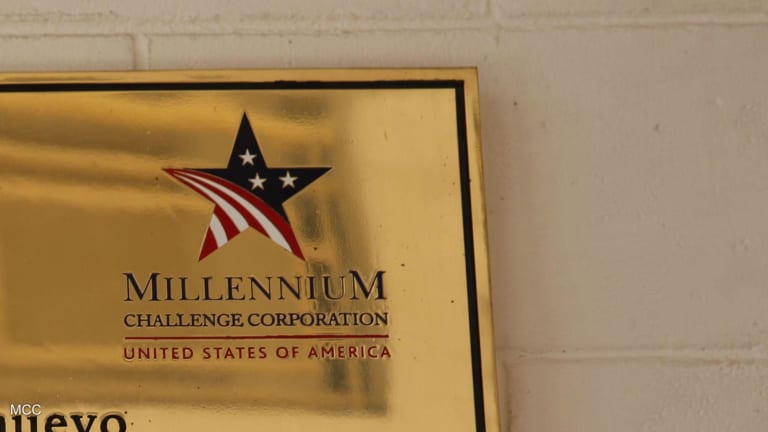Shortly after his return in 2004 from a year-long mission setting up the Iraqi Ministry of Finance in Baghdad, Rodney Bent explained how a long-time accountant in the Office of Management and Budget accepted such a dangerous assignment. “It was a little spontaneous,” he admitted. “I got a call from the Pentagon asking if I knew anybody who would be interested in working on budgets in Iraq, and I said I would. And they said, ‘Well, the search is over.’”
This is one accountant who needs no abacus. Despite two decades toiling in the musty dens of governmental finance, Rodney Bent is not the stuffy number-cruncher one might expect. The deputy CEO of the Millennium Challenge Corporation is a large, enthusiastic man who smiles broadly, thinks with quick precision and tends to make life-altering decisions in an instant.
Though clearly courageous – his work in Baghdad garnered the Secretary of Defense Medal for Exceptional Public Service – to Mr. Bent the Iraq decision was simple. “I thought that having worked in budgets and having some familiarity with the Middle East that I could contribute something,” he explained before digging deeper. “It may sound a little bit corny, but sometimes when you see a major problem and you think you can make a contribution to it, it makes you right above yourself in some way — doing things for other people, doing things for a greater good.” He was further moved by a “considerable optimism about what the country could become.”
An optimistic, spontaneous and idealistic bureaucratic lifer might be a contradiction. But such an exotic bird might also be perfectly tailored to run the MCC, a post that seemed unlikely as Mr. Bent left college.
After obtaining his B.A. in history from Cornell, he worked and studied languages for a few years in Europe. While there he discovered his profound interest in international issues, which led to a Master’s at the Fletcher School of Law and Diplomacy and then finally back to Cornell for an M.B.A. His career began in the private sector, as a banker in New York, and soon moved to Washington, D.C. and OMB, where he learned the ropes of the private sector. Over two decades later the opportunity in Iraq arose and he jumped.
Mr. Bent admits the work there wasn’t easy. “Usually if you are working in a Western development agency, you are in education, or agriculture, or infrastructure, or government finance,” he said. “In a place like Iraq you have to be all at the same time.” But neither was it entirely new. “Development issues cut across the whole spectrum,” he said, citing the nurturing of good governance, fighting corruption, and fostering a favorable business environment as essential no matter the circumstances.
When Mr. Bent was appointed vice president for policy and international relations at MCC less than a year after his return from Iraq many in the development community expressed skepticism. “Rodney is extremely experienced and a well-respected budget and accounting professional who played a critical role in the transition of Iraq,” wrote Sheila Herrling, an analyst from the Millennium Challenge Account Monitor blog. “Less obvious is the development policy, international organization, and on-the-ground experience.”
Mr. Bent does not entirely disagree, calling the offer “pure coincidence.” In truth, he had served on the OMB group that designed and created the MCC. But he had little interest in the post until he met MCC CEO John Danilovich, whom he called “a good leader with great vision.” He quickly accepted and was later promoted to deputy CEO.
Equal parts lending institution, aid organization, and taskmaster, the MCC was created by the Bush Administration in 2004 as a tool to link governance and growth in developing countries. After a sluggish start it has achieved some success, particularly with projects in Nicaragua, Georgia, and Tanzania. About the corporation’s ideals Mr. Bent is forthright. “You can’t just pursue one solution,” he said, considering the web of problems that vex the developing world. “In fact, all solutions have to come together. It’s not like you can tackle, as an example, corruption in one aspect.”
Near the end of the interview Mr. Bent offered professional advice, stressing international experience for those who wish to pursue a career in international development. “How do you know if you are interested in development if you never worked abroad?” he wondered, listing the Peace Corps, assistance to non-governmental organizations, and work, study, or travel abroad as viable options. “The most important thing is to discover what you really most enjoy doing.”
Achieve that goal and a life of development work may be just around the corner. “If you know yourself well enough to know what you would enjoy about it, I think wanting to take some risks is a good thing,” said Mr. Bent, whose best jobs arose from happenstance. “Sometimes doing something new and challenging is a good thing.”




